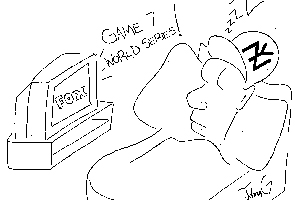Babe Ruth once said, “Every kid grows up and dreams of being a New York Yankee.” Here is the problem: I don’t hear anyone saying they dream of being a St. Louis Cardinal or aTexas Ranger.
A Yankee payroll of $202 million and a Philadelphia Phillies payroll of $172 million could not buy them a World Series appearance. A whopping $161 million didn’t even get the Red Sox into the play-offs. These are not only three of the MLB’s top spending teams, but they are also three cash cows.
Like it or not, baseball needs these teams in the Series to make money. Everyone knows about the Yankees-Red Sox rivalry, but not many people know about the bad blood between the Cardinals and the Brewers. These teams are also division rivals who never really seemed to like each other. The difference is the casual baseball fan would not be aware of the latter rivalry.
Even with exciting playoff series and walk-off home runs, baseball is forced to sell a Texas-St. Louis the Series. Granted, this gives hope to suffering fans, but I have yet to see anyone jump for joy at the thought of that match-up.
A Series without the Yankees, Red Sox or Phillies is also one with poor ratings. Last year, a regular season NFL game between the Saints and Steelers had better ratings than Game 4 of the Series between Texas and San Francisco. Texas has made the Series for a second straight year and it doesn’t look like the ratings will be any better this time around.
The Yankees and Red Sox are not only nationally cheered, but they are collectively jeered as well. The Chicago White Sox former owner Bill Veeck once said, “Hating the Yankees isn’t part of my act. It is one of those exquisite times when life and art are in perfect conjunction.”
Baseball will have a tough time selling small market teams, because no one outside of those cities has invested interest.
Baseball’s effort to achieve parity has hurt them in the check book. Yes, the recent release of the movie “Moneyball” has made a compelling argument for small-market teams, but it was the big markets of New York and Boston that carried the play-offs from 2001-2003. Being a Giants fan, I am the first person to admit that I love seeing different teams win, but America doesn’t. America loves to hate the Yankees, they do not love to hate the Rangers or the Cardinals.
Nine of the ten spending teams are all gone. The question is, how do they plan on selling the other 21?
In the days of three-run homers and 9-to-8 ball games, the MLB cannot sell equality and fairness anymore.

